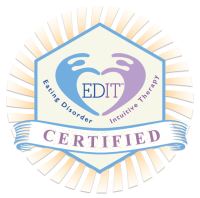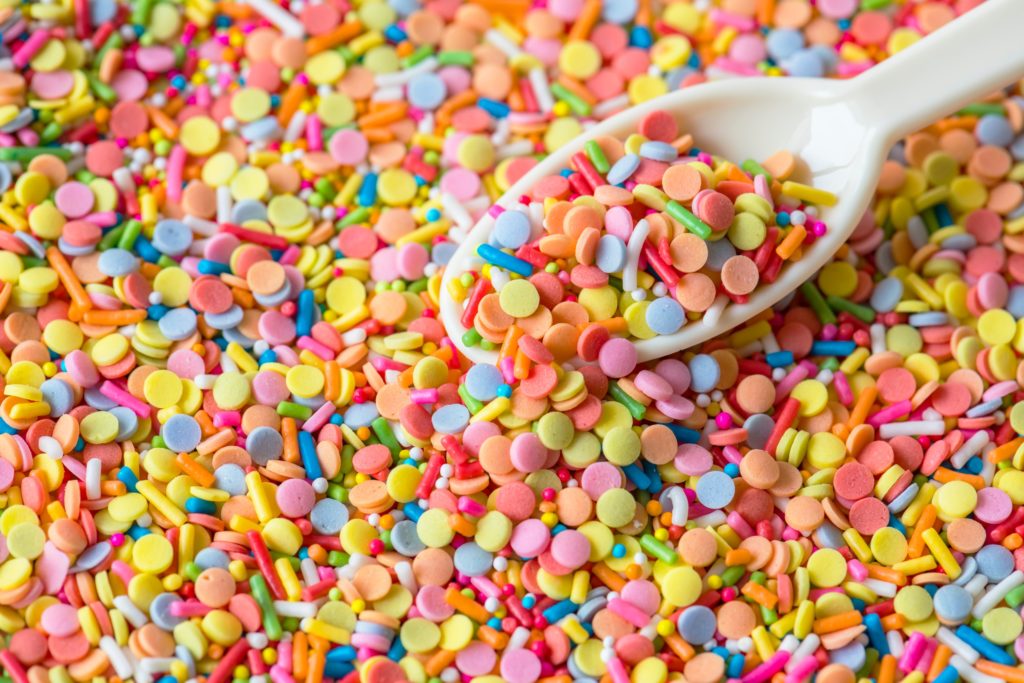Sugar Addiction: Eat More Protein and Crave Less Sugar
I’d like to introduce you to Janelle Hunt, who is a Registered Dietitian and an EDIT™ Certified III – Eating Disorder Treatment Clinician. Janelle worked with me at my previous office location in Denver, Colorado. She is a knowledgeable and compassionate clinician, who specializes in nutritional counseling for people in recovery from eating disorders. She guides her clients to learn the real facts about nutrition – in this article, you’ll learn the facts about fats. If you’re “hungry for more,” please contact Janelle about becoming a client (see bottom of article).
– Dr. Dorie
Sugar addiction – a behavior of binge eating sugary foods – is a problem reported by many people, especially at this time of year, when Halloween candy is so prevalent! Some “sugar addicts” attempt to abstain from sugar, only to find that restriction can trigger binge eating. As I discussed in a previous blog, carbohydrates are essential for health, and sufficient carbohydrate consumption can reduce cravings for sweets.
Now, let’s look at the importance of protein. I find very few of my clients are fearful of protein, which seems to stem from the messages from the media telling us that if we consume lots of protein, that means we will lose weight and fit into society’s view of perfection. I specifically just read an article saying protein can help us lose belly fat. Honestly? Let’s think about that a minute. How can eating a chicken breast cause fat in our belly to shrink?
Keep in mind that everything we eat breaks down into calories. If we over consume calories, we gain weight; if we restrict calories, we’ll lose weight. We should consume a variety of nutrients from all food groups. We do not gain or lose weight from certain foods, but rather from calories. For example – if we eat fat, it does not immediately turn into fat in the body, nor does protein foods immediately turn into muscle in the body. All food breaks down to calories and the body uses them where they’re needed or burns off what isn’t needed.
To better explain this, let’s say you overall eat a balanced diet and your weight is maintaining. If you all of a sudden decide to eat an additional 500 calories of protein each day for a week and the next week decide to switch that and instead consume an extra 500 calories of butter; you will still gain the same amount of weight both weeks because you over-consumed calories. You won’t gain muscle weight when eating the protein and weight in fat when you consume the fat. That’s not how our body works.
Foods containing protein are broken down to smaller molecules in our body called amino acids. Examples of a few protein-rich foods are meat, dairy products, eggs, nuts, lentils, soy, tofu and tempeh. Protein is essential for our body to build muscle, since muscle is made up of amino acids. We have to be physically active, though, in order to use protein we eat to make muscle. This can include walking or light activity.
The other essential reason we need to consume protein is that it is needed to send the signal to your brain that you’ve eaten and help you feel satisfied. This is why diets push consuming more protein. If you eat toast for breakfast, it has very little protein, so your brain is not told you’ve eaten and that’s when clients start to notice sugar cravings and overeat the rest of the day. However, if you had a couple of eggs or Greek yogurt with your toast, the brain gets the signal that you’ve eaten and less cravings tend to happen, which means decreased over-consumption of calories.
So if you find that you never feel satisfied during the day or constantly crave sugar as in a “sugar addiction,” try to have a bit more protein for breakfast and see if this helps!
*****
Looking for guidance with NUTRITION? Contact Janelle Hunt, MS, RD – the author of this blog article. She is an EDIT™ Certified III – Eating Disorder Treatment Clinician, and has a specialty in nutritional counseling for eating disorders. – EMAIL JANELLE
Interested in a FREE consultation with Dr. Dorie? Dr. Dorie is passionate about her method of Eating Disorder Intuitive Therapy (EDIT)™ to help people overcome eating disorders and addictions. She provides customized counseling for eating disorders and alcohol / drug addiction at her Positive Pathways treatment center in Evergreen, Colorado – and EDIT™ eating disorder training and certification for coaches and clinicians worldwide. CALL 303-494-1975 – EMAIL DR. DORIE

